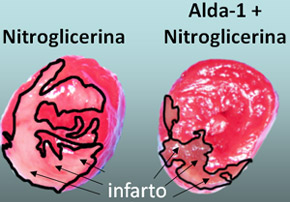

A study that included the participation of an FAPESP fellow published in Science Translational Medicine describes a new molecule that inhibits injury to the heart due to nitroglycerin tolerance.
A study that included the participation of an FAPESP fellow published in Science Translational Medicine describes a new molecule that inhibits injury to the heart due to nitroglycerin tolerance.
A study that included the participation of an FAPESP fellow published in Science Translational Medicine describes a new molecule that inhibits injury to the heart due to nitroglycerin tolerance.

A study that included the participation of an FAPESP fellow published in Science Translational Medicine describes a new molecule that inhibits injury to the heart due to nitroglycerin tolerance.
By Mônica Pileggi
Agência FAPESP – A study published in Science Translational Medicine, in which an FAPESP fellow participated, describes a molecule that, when administered together with nitroglycerin, can prevent more severe heart attacks that result from tolerance to the compound.
Nitroglycerin is an explosive chemical compound produced by the nitration of glycerol. Aside from its use in explosives, the compound has been used in medicine for hundreds of years as a vasodilator in the treatment of chest pains known as angina. It is also used in hospital emergency rooms when patients arrive showing signs of acute myocardial infarction.
However, the benefits of nitroglycerin are limited by the development of tolerance to the compound. In this study carried out in the Department of Chemistry and Systems Biology at the Stanford University School of Medicine, Brazil’s Julio Cesar Batista Ferreira and China’s Lihan Sun, doctoral candidates at the institution, discovered that nitroglycerin intolerance is not due only to the loss of the medicine’s vasodilation effect.
According to Ferreira, the sustained use of nitroglycerin following myocardial infarction can cause devastating effects on the heart. The study was coordinated by Professor Daria Mochly-Rosen.
Nitroglycerin tolerance is the result of inactivation of aldehyde dehydrogenase 2 (ALDH2), an essential enzyme for cardiac care of human and animal heart attack victims. The results of the study were published at the beginning of the month in Science Translational Medicine.
The study verified that the molecule, ALDA-1, also discovered by the Stanford researchers, is able to maintain the function of ALDH2 and avoid the deleterious effects resulting from nitroglycerin tolerance during a heart attack.
Ferreira did his master’s, doctoral and post-doctoral work at the Universidade de São Paulo (USP) School of Physical Education and Sports with FAPESP funding and is currently at Stanford University. He will return to USP in 2012 after being selected to lecture in the Biomedical Sciences Institute’s Anatomy Department.
According to Ferreira, when administered together with nitroglycerin, ALDA-1 keeps the ALDH2 enzyme activated during myocardial infarction, inhibiting the damaging effects of nitroglycerin tolerance on the heart.
“Doctors usually administer nitroglycerin in on/off cycles in chest pain and heart attack cases—16 hours with the medication and 8 hours without—in the attempt to mask the tolerance effect. But, this prolonged period leads to the inactivation of ALDH2, elevating chances of more severe infarction,” he told Agência FAPESP.
The researcher explained that ALDH2 is a mitochondrial enzyme whose functions are essential in the cardiovascular system, including catalyzing the conversion of nitroglycerin to the vasodilator nitric oxide and removing toxic aldehydes produced during myocardial infarction.
“With the inhibition of the enzyme by the excess of nitroglycerine, the aldehydes accumulate in the heart and begin to connect to proteins, lipids and DNA, resulting in cellular death during myocardial infarct. With ALDH2 activated, it’s possible to remove these aldehydes more easily, minimizing damage to the heart,” Ferreira said.
The study was performed in rats. After administration of nitroglycerin for 16 hours, the researchers induced myocardial infarction in the animals and observed that the group treated with nitroglycerin presented greater cardiac dysfunction than the other groups during the three weeks following the infarct.
“However, when we administered the nitroglycerin together with ALDA-1, the harmful effects of tolerance to the medication didn’t manifest themselves,” he noted.
The article, “ALDH2 Activator Inhibits Increased Myocardial Infarction Injury by Nitroglycerin Tolerance” (doi: 10.1126/scitranslmed.3002067), by Júlio Cesar Batista Ferreira and others, can be read by subscribers to Science Translational Medicine at: http://stm.sciencemag.org/content/3/107/107ra111.abstract.
Republish
The Agency FAPESP licenses news via Creative Commons (CC-BY-NC-ND) so that they can be republished free of charge and in a simple way by other digital or printed vehicles. Agência FAPESP must be credited as the source of the content being republished and the name of the reporter (if any) must be attributed. Using the HMTL button below allows compliance with these rules, detailed in Digital Republishing Policy FAPESP.





